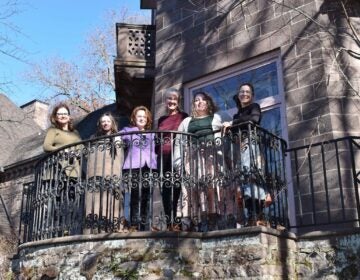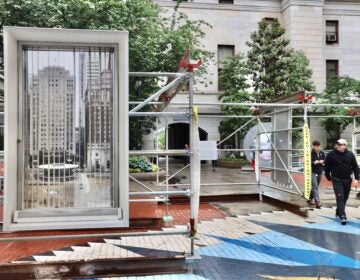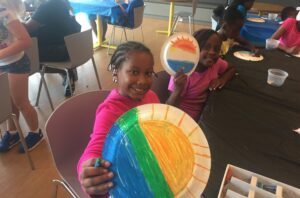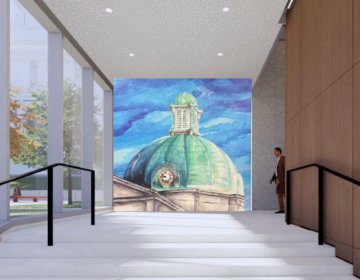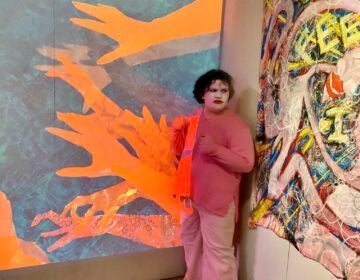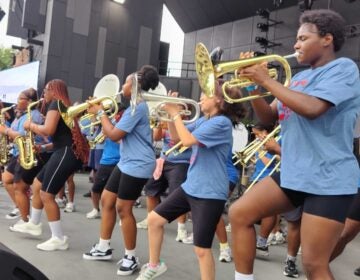Montgomery County high school senior crowned national youth poet laureate
Evan Wang, a senior at Upper Merion High School, wants to see young people engage with poetry off the page and in everyday life.
Listen 1:12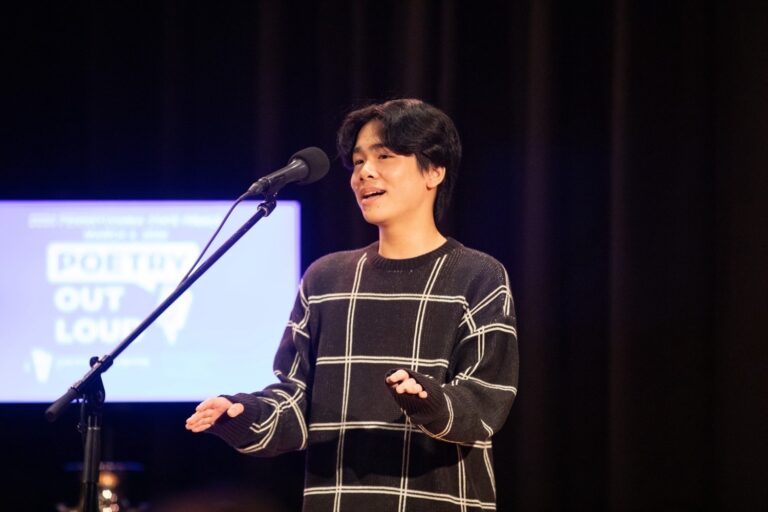
Evan Wang performing at the Pennsylvania State Poetry Out Loud Championship. (Courtesy of Evan Wang)
From Delco to Chesco and Montco to Bucks, what about life in Philly’s suburbs do you want WHYY News to cover? Let us know!
Evan Wang, a graduating senior at Upper Merion Area High School, has been named this year’s national youth poet laureate. He is the first male youth poet laureate in the program’s nine-year history.
Wang, 18, of King of Prussia, told WHYY News that he has “always been fascinated by languages.” As a first grader, he constantly read books and wrote short stories, and in middle school, he started penning poems. He delved into the work of renowned poets, including Savannah Brown, Ocean Vuong, Louise Glück and Ada Limón, to learn more about the craft. Word by word, he threaded together verses in his Google Docs and Notes app, occasionally sharing it on Instagram.
But it wasn’t until the COVID-19 pandemic that Wang shared his poetry widely, and witnessed the impact his verses could have on his community.
One spring day in 2021, Wang was walking through the park behind his home, when a group of kids shouted an ethnic slur at him. The incident came amid a rise in hate crimes against Asian Americans around the country.
Out of that experience, Wang wrote a six-minute-long poem called “The Blood We Inherit, The Blood We Spill.”
He worked with different cultural clubs throughout the school district to organize a forum on the Asian American experience and recognizing microaggressions. His poem served as “the helm” of the event and was then broadcast throughout the school district for two weeks. Soon, Wang said, “everybody knew the first line”: “When will I live in a world where I’ll be able to leave my burrow?”
“It kind of launched me into local stardom, and I realized, if this was the first time I’m sharing my work with the world, and it was successful, what would happen if I continued sharing it?” he said. “And that’s how I really began using my voice for social change, recognizing how literature can pull together a community.”
For Wang, that connection between the written or spoken word and community action is key to what he wants to accomplish in his term as national youth poet laureate.
“I think poetry is so powerful because, as Audre Lorde said, poetry is not a luxury,” he said. “And what poems do is that once you hear the ideas within the poem, those ideas inspire action, and that’s how we really engage with civic engagement, even if you are not interested in politics.”
Studies show poetry is a powerful tool to affect students’ self-concept and societal engagement. Researchers have found success in using poetry and spoken word to help marginalized youth see themselves as change agents, to foster a more positive sense of racial identity in Black girls and increase empathy among medical students.
On an academic level, poetry can boost students’ overall reading and writing proficiency. According to literacy education professor Timothy Rasinski, poetry’s shorter, engaging and playful format makes reading it out loud one of the most effective ways to help early readers develop the building blocks of literacy.
Outside of the classroom, Wang said, poetry is also an avenue of change.
“The powerful thing about art is that everybody can create it, and especially in the current time we are in, art is used as a form of resistance,” he said. “It is a way to advocate for ourselves, to showcase the common voice, when other large other systems that we are part of, larger than us, do not want to showcase that. And as long as they hold on to our individual voice and showcase it to the masses, in public media, we defy the erasure of us. And I think that is so powerful and something that a lot of young people should stick to.”
Creating the Montco Youth Poet Laureate program
Wang said when he watched Amanda Gorman, the inaugural national youth poet laureate, read her poem, “The Hill We Climb,” at President Joe Biden’s inauguration in 2021, he realized he wanted to follow in her footsteps.
“I wanted to become a poet laureate just like her, because I wanted to, I guess, inspire young people to write poetry as well and to be proud of my body of work while walking across the stage like a poet laureate,” he said.
When Wang realized Montgomery County didn’t have a youth poet laureate program, he reached out to the adult poet laureate program and asked to partner with them to create a youth program. He spent a year working with Executive Director Joanne Leva.
Previous county poet laureates chose Wang as the inaugural Montgomery County youth poet laureate in 2022.
“[It] was honestly a decision that changed my life,” Wang said.

During his term, Wang championed poetry for young people throughout the county, working with over 14 libraries to host open mics and writing workshops, teaching creative writing to over 400 teenagers. Wang traveled up and down the East Coast, and was invited to the White House to speak to the U.S. Department of Education.
“Becoming the youth poet laureate from Montgomery County was essential to my growth as a poet, not only engaging with the local community, but also traveling nationally to impact the literary scene across the country,” Wang said.
Now, he plans to take those experiences to the national stage, to share the power of poetry with young people throughout the country.
‘A rallying call’
Wang said that while preparations are still underway for what he will do during his term as national youth poet laureate, he already knows he wants to use his platform to champion poetry as an interdisciplinary art form and show young people how to engage with poems in everyday life.
“There is a rise of the younger generation not engaging with art, not engaging with literature, and that is something I’m seeking to change during my term, which is expanding poetry’s territory in entertainment and in popular media,” Wang said. “Poetry no longer just lives on the page. It leaps off of it. It is a rallying call. It raises awareness for certain issues. It is now in places and rooms that we never thought possible: performed at the presidential inauguration, performed at the Super Bowl, or performed at the Grammys … That’s really powerful, because I think the more people see it in ways that are nontraditional, the more people recognize that, oh, poetry has the ability to live in our daily lives in the contemporary sense.”

Though nontraditional, in some ways, making poetry more accessible and integrated into everyday life harkens back to ancient cultures and ways of performing poetry for masses.
For the ancient Greeks, poetry was “their entertainment,” Wang said.
“I think the education system really just confined poetry to just on the page to analyze the poem and sort of answer it, as if the poem is a question,” he said. “And the poem is not a problem to be solved. I think a poem can mean so many different things to so many different people. It’s up to interpretation, and I think that sort of mystery is what makes it so powerful to people.”
Wang is demonstrating poetry’s expansive possibilities through his own work. He’s currently partnering with composer Baldwin Giang to write a choral piece for Mendelssohn Chorus, which will perform the work in June 2026.
‘A form of resistance’
Wang, a first-generation American who is heading to Harvard University this fall to study biology and creative writing, said much of his work focuses on racial identity, the diasporic experience and sexuality.
But recently, he said, he has been focusing on a new theme: hope.
“I think that’s so important to address now,” Wang said. “My school asked me to write a poem for our graduation. And so, of course, for that poem, I had to write something about hope. And it’s hard to write about hope if you’re not actively thinking about it, so you really have to train your mind to write about hope.”
Wang said he sees poetry as inextricably tied to democracy.
“By engaging with systems, you are inherently changing it, and that’s how you remain engaged in civics,” he said. “And the powerful thing about poetry is that, in my opinion, at its core, poetry is a feeling, and that’s able to resonate with everyone. That’s why we look at certain circumstances in our lives and think, oh, that’s poetic. Or we look at birds in the sky, we think that’s poetic. There’s poetry all around us. And as long as we engage with that, engage with these art forms, we are basically engaging in democracy.”
Wang’s advice to aspiring young writers and poets: “Stay honest and stay vulnerable.”
“When you really allow yourself to be vulnerable, to write the poem and hold nothing back, that is when the poem is alive, and that’s what I encourage all young writers to do,” he said.
Celia Bernhardt contributed to this story.
Editor’s Note: This story is part of a series that explores the impact of creativity on student learning and success. WHYY and this series are supported by the Marrazzo Family Foundation, a foundation focused on fostering creativity in Philadelphia youth, which is led by Ellie and Jeffrey Marrazzo. WHYY News produces independent, fact-based news content for audiences in Greater Philadelphia, Delaware and South Jersey.

Get daily updates from WHYY News!
WHYY is your source for fact-based, in-depth journalism and information. As a nonprofit organization, we rely on financial support from readers like you. Please give today.



